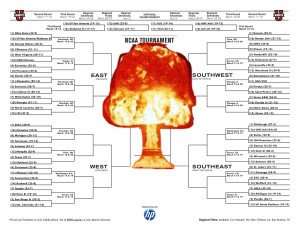This year’s NCAA Men’s basketball tournament is quickly becoming one of the most memorable tournaments of all time as we are guaranteed to see either an 8 seed or an 11 seed in the championship game. Seeing Butler make the Final Four two years in a row and watching relatively unknown Virginia Commonwealth University take out traditional powerhouses depicts exactly what so many of us love about this tournament. Sure it can be random and the best team doesn’t always win, but that makes each game, even the seemingly meaningless 1 vs 16 matchup, potentially thrilling. For every champion we remember, we remember the story of an unknown school with unknown players making deep run through the tournament.
Unfortunately there is a growing sect of people out there who are really bothered that there are no number one seeds in the Final Four this year. They decry that this makes the regular season irrelevant and that a team riding a hot streak can make it through rounds too easily. The morning sports chat shows this week have been brainstorming ways to fix this “problem” as though public consensus is that there is a demand for change. Unless I’m mistaken, the majority of us are happy with the tournament and love the current format (I’m not extending that love to the “first four” games, sorry) and aren’t seeking any major changes.
Here’s where the old adage of not fixing what isn’t broke comes in. Is the tournament perfect? No, and there is always room for improvement. Is having no number one seeds in the Final Four evidence that the system needs to be reconstructed? Definitely no. I’m not a TV ratings kind of guy, but the tournament from my perspective is extremely popular and not just among regular basketball fans. Bracket-mania pulls the casual fan into the mix and even creates a new genre of fan, the “I don’t know what a pick and roll is but I’m excited about this bracket” fan. Schools like Kansas and Duke just expect to be in the tournament year in and out, but I saw first hand the local excitement created when a school such as Northern Iowa does it’s best job screwing up brackets across the country.
Before we debate the merits of the need for home court advantage or providing easier routes for the top seeds, let’s look at some facts. In 1985 the tournament took its current format (more or less) of a 64 team field. Since then, 17 of the 27 possible tournament champions were number one seeds (63% of the time). The remaining ten champions consist of three number two seeds, three three seeds, two four seeds, one six seed, and one eight seed. There have been 108 possible Final Four slots in the same time period and number one seeds have combined for 45 (42%) of those slots. Let’s compare this to the NFL playoffs which seems to be the gold standard which we compare the success of any sporting league to. Considering the same time period (since 1985), a number one seed has won the championship in 14 out of 27 years (52%). That’s represents a top seed success rate of over 10% less than the NCAA. Keep in mind that number one seeds in the NCAA men’s hoops tourney make up about 6% of the field of 64 while the two NFL top seeds make up nearly 17% of the field of 12, so by the numbers thee NCAA shouldn’t have a higher “success” rate yet they do. The NFL does get their top seed(s) to the championship game 52% of the time, a 10% better rate than the NCAA in terms of getting top seeds to the Final Four*, but the top seeds are given a first round bye and need to win just two games to get to the Super Bowl versus the four games it takes to reach the Final Four. So a league that we love comparing other sports too, a league that gives their top seeds a first round bye and home field advantage up to the Super Bowl, has a top seed success rate less than that of a much larger NCAA hoops tournament? Don’t get me wrong, I love both leagues and am happy with their playoff formats, but my guess is that the same people complaining that the NCAA tournament isn’t fair to the top seeds will be the same people who love the NFL playoff system.
I’d also like to put the argument that this year’s lack of number one seeds is proof that the regular season doesn’t matter to rest. The regular season, in any sport, matters as far as playoff seeding and essentially ends there. The NBA playoffs aren’t called the “second season” for nothing. Teams do what they need to often times to get themselves into the playoffs and, if possible, work to improve their positioning for the post-season match-ups. But once the playoffs start, all that can go right out the window and the two teams facing off decide who goes on. NCAA hoop teams compete for the top spot knowing that it puts them in the best spot to play the weakest teams. If a top spot was meant to mean an all but guaranteed trip to the Final Four, why even bother with the other rounds? The point is that the regular season allows teams to fight to get themselves in a good position, but then it is up to them to take advantage of that position and finish out the season strong. For every VCU there is a 6 seeded 2010-11 Green Bay Packer team ready to shake things up. This isn’t a bad thing for the NFL, and it isn’t for the NCAA either.
This is the most popular sporting tournament in America for a reason, and that reason is playing out in front of us right now. Instead of running around playing Chicken Little crying about the falling sky, sit back and enjoy the madness that is March.
*I realize I’m comparing the Final Four (4 teams) to the Super Bowl (2 teams) but consider this a fair comparison since it would be impossible to have all four number one seeds in the championship game….although let’s not put anything past the NCAA tournament committee**.
**Play-in games featuring two 11 seeds squaring off and two 12 seeds doing the same? So you’re saying it makes sense that the losers of this game would have been better off being a 13, 14, or 15 seed? How can you have two 16 seed teams not having a play-in game but have teams that are ranked higher duke it out for a spot? Seriously? I digress…





Thanks for helping me out with this, Butler.